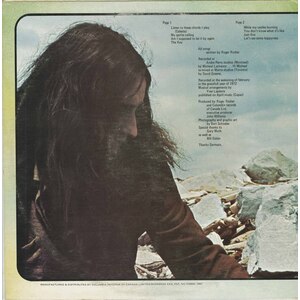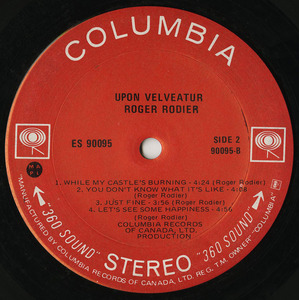Information/Write-up
Roger Rodier was born and raised in Montréal, a quiet, introspective kid who found his way into music the same way a whole generation did: by seeing the Beatles on television in the mid-1960s and feeling the ground shift. He taught himself guitar, discovered he could sing, and began writing songs that were already more inward and searching than the typical teen-beat fare of the day. His first steps were in local bands like the Mockers and the Mike Jones Group, playing English-style rock in Montréal bars and youth clubs and even cutting an acetate with hopes of landing a deal in New York. Nothing came of those early trips, but they gave him stage experience and convinced him that songwriting, not showmanship, was his real strength.
Toward the end of the decade Rodier drifted toward the booming folk scene. He joined an acoustic trio called At The Age Of Three, a harmony group built around three voices and guitars that drew loosely on the Crosby, Stills & Nash template. The band never managed to document itself properly, which later frustrated him, but it brought him into close musical partnership with guitarist Germain Gauthier. Around 1968–69 the two broke off as a duo, Rodier-Gauthier, and began exploring a more delicate, psychedelic folk sound that merged French and English influences.
Their work found a temporary home on Pax, a tiny Montréal label launched by cousins John and Denis Pantis. Under the Rodier-Gauthier name they recorded two 45s that, in hindsight, map out the path Rodier would later follow. “L’Herbe” and “Tu Viendras,” sung in French, float on light, trippy arrangements and gentle melodies; the follow-up “Have You?” backed with “Overseer” moves further into dreamy, Anglophone psych-folk with searching vocals and subtle arrangements. The records were pressed and released with little promotion and almost no radio play. For decades even Rodier himself rarely heard them; they circulated quietly among collectors and only resurfaced widely when they were attached as bonus tracks to a later reissue.
The end of the 1960s found Rodier restless. At The Age Of Three had not recorded, the Pax singles had vanished without a trace, and the Montréal scene was changing around him. With the help of his manager John Curl, he approached Columbia Records’ Canadian office in Toronto. After submitting demos and playing live for label executives, he was offered a solo contract. Columbia’s belief was that his introspective songs and soft, distinctive voice could place him alongside the emerging singer-songwriters of the era.
Work on the album that became Upon Velveatur began at the start of 1972 at André Perry’s studio in Montréal, one of the city’s new state-of-the-art facilities. Rodier produced the sessions himself, drawing on players from his circle. Germain Gauthier contributed guitar, including a memorable phased solo on “Am I Supposed to Let It By Again?” while other musicians added drums, horns, and occasional keyboards. A guitarist known only as Red Mitchell came in long enough to deliver the searing electric part on “While My Castle’s Burning,” leaving behind one of the album’s most dramatic signatures before disappearing from Rodier’s life. Columbia staffer Gary Muth took an active interest, nudging Rodier toward subtle overdubs – a synthesised French horn line here, a textural flourish there – that broadened the arrangements without swamping the songs.
The material Rodier brought into the studio drew on several years’ worth of writing. Pieces like “My Spirit’s Calling” and “The Key” are philosophical and inward-looking, threading his gentle voice through acoustic guitar and carefully arranged strings. “Listen To These Chords I Play (Celeste)” began as a meditation on a feeling rather than a character; “Celeste,” he later explained, was originally just the song’s name, more like a mood or perfume than a person. “Just Fine” and “Let’s See Some Happyness” (with its intentionally off-kilter spelling) carry a lighter melodic touch, but are still tinged with the mild melancholy that runs through his work. At the other extreme is “While My Castle’s Burning,” where his usually restrained singing breaks into ragged cries over slashing guitars and tense orchestration – a rare glimpse of rage from a writer more often content to stand at an emotional distance and observe.
Musically, Upon Velveatur ended up much closer to the early-’70s British folk-rock sound than anything happening on North American AM radio. Listeners later heard echoes of Nick Drake, Al Stewart, Donovan, even hints of West Coast harmonies and Laurel Canyon singer-songwriting, but at the time Rodier occupied his own quiet corner. The album moves between hushed, almost weightless acoustic passages and fuller, rock-edged sections with drums, female backing vocals and thick electric guitar, creating a shift in mood that can feel almost bipolar from track to track. That internal tension – between contemplation and eruption, isolation and communal lift-off – is part of what has kept the record interesting for later generations.
Before the LP appeared, Columbia issued “The Key” backed with “Easy Song” in May 1972, giving Rodier his first major-label single. Canadian trade paper RPM described it as a strong debut with an unusually intimate vocal sound, but sales were modest and the B-side was ultimately left off the album, a decision Rodier himself never fully understood. When Upon Velveatur finally came out that autumn, in Canada only, it was packaged with a lyric booklet and wrapped in an enigmatic cover photo of the long-haired singer half obscured in mist, title scrawled in a mysterious script. The phrase “Upon Velveatur,” he later explained, was meant to suggest a mental space where imagination could drift freely – part dreamworld, part inner sanctuary.
For a moment it looked as if Columbia might succeed in transforming this quiet Montréal songwriter into a national presence. Critics responded enthusiastically. Lester Bangs, writing in Rolling Stone, singled out the album’s grace and atmosphere, while Canadian writers went so far as to call it one of the most impressive and uniquely Canadian LPs they had encountered, suggesting Rodier was destined for much wider recognition. Yet the realities of promotion were far less focused. The label’s campaign was sporadic, with the record appearing at different times across the country and receiving only patchy radio support. Two additional singles – “Listen To These Chords I Play (Celeste)” backed with “My Spirit’s Calling,” and “Am I Supposed to Let It By Again? (Above the Covers)” paired with “You Don’t Know What It’s Like” – did little to change its commercial fortunes.
Rodier himself was never comfortable with the machinery of hype. Columbia flew him into cities, booked good hotels and tried to stage the usual round of interviews and press parties, but he disliked the idea of being paraded as a prodigy and drew back from the spotlight. Journalists at the time described a soft-spoken, almost reticent figure who answered questions politely but kept a protective distance. Live performances were rare, though those who saw him recall striking shows: just Rodier with an acoustic guitar and minimal accompaniment, occasionally sharing bills with international acts such as Procol Harum and Genesis. A contemporary review noted how closely his stage sound mirrored the album’s intimate atmosphere and praised the warmth of his lyrics and the unforced sincerity of his presence.
In early 1973 he began assembling songs for a second Columbia album. The project was announced in the Canadian music press, but for reasons never fully documented it stalled and was abandoned. Rodier continued to write and play for a few more years, yet nothing further was released. Gradually he slipped out of the music world altogether. Friends from the old days recall him turning inward, more interested in spiritual reading and quiet contemplation than in chasing the next tour or single. Eventually he left Montréal for Western Canada, building a new life far from the industry, reportedly working in real estate and keeping his musical past at arm’s length. To those who knew him, it felt as if he had deliberately closed the book on that chapter.
Meanwhile, the original pressing of Upon Velveatur – barely promoted at the time and never issued outside Canada – faded into obscurity. Copies trickled into the hands of collectors and a small cult slowly developed around its blend of fragile folk, orchestral sweep and occasional bursts of electric fire. Listeners heard in it the same haunted, twilight quality that had made records by Nick Drake, Gary Higgins or Pearls Before Swine so treasured. Writers in later decades described it variously as loner folk, psych-folk, or simply a beautifully strange singer-songwriter album that seemed to have arrived from somewhere just slightly out of phase with the rest of the early ’70s.
The rediscovery gathered momentum in the 2000s, when British label Sunbeam undertook a proper reissue. Working with Rodier, they prepared a remastered edition of Upon Velveatur, adding the non-LP B-side “Easy Song” and the four Pax-era Rodier-Gauthier tracks as bonus material, alongside rare photographs and extensive liner notes written by the man himself in 2006. For many listeners this was the first chance to hear the full arc of his recorded work, from the late-’60s psych-folk singles through the Columbia sessions. Critics greeted the reissue as a lost classic, drawing renewed parallels to Drake, Donovan, Vashti Bunyan and the softer edges of West Coast rock, while also recognising that Rodier’s songwriting had its own particular voice – gentle but unsettled, spiritual without being doctrinaire, and always slightly removed from the mainstream around it.
Today Roger Rodier stands as one of the great ghost figures of Canadian music: a Montréal singer, guitarist and writer who made a single fully realised album, brushed briefly against major-label expectations and then walked away. Upon Velveatur, once barely circulated, now occupies a secure place in the international psych-folk canon, cherished for its combination of intimate songs, inventive arrangements and a mood that hovers between serenity and quiet turmoil. Its survival owes as much to the dedication of listeners and archivists as to the industry that originally launched it, but that seems fitting for an artist who was never especially interested in fame. In the end, his small body of work speaks clearly for him – a rare and remarkably self-contained document of a particular time, place and state of mind in Canadian music.
-Robert Williston
Written and produced by Roger Rodier
Musical arrangements by Yves Lapierre
Recorded by Michael Lachance
Re-mix by David Greene
Executive producer John Williams
Photography Bart Schoales
Graphic art Bart Schoales
Recorded at Studios André Perry, Montréal, Québec
Re-mixed at Manta Sound, Toronto
Mastered at Customatrix
Manufactured by Columbia Records of Canada, Ltd.
Distributed by Columbia Records of Canada, Ltd.
Manufactured & distributed by Columbia Records of Canada, Ltd. / Shorepak Can. Pat. No. 758888, 1967
Recorded at the wakening of February in the graceful year of 1972
Published on April Music (CAPAC)
Special thanks to Gary Muth and Bill Eaton
Thanks Germain






No Comments